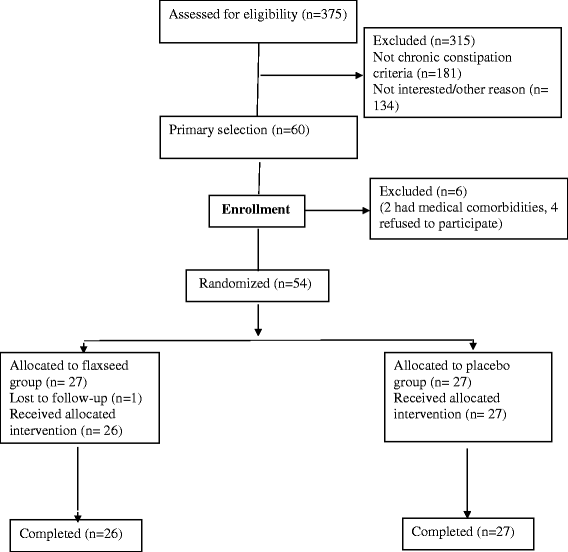A randomized trial of the effects of flaxseed to manage constipation, weight, glycemia, and lipids in constipated patients with type 2 diabetes - PubMed (original) (raw)
A randomized trial of the effects of flaxseed to manage constipation, weight, glycemia, and lipids in constipated patients with type 2 diabetes
Noureddin Soltanian et al. Nutr Metab (Lond). 2018.
Abstract
Background: To compare the effects of baked flaxseed versus those who received a placebo on constipation symptom scores, weight, glycemic and lipid control in constipated patients with type 2 diabetes (T2D).
Methods: In a single-blinded, randomized controlled trial, 53 constipated patients with T2D with body mass index (BMI) 20.5-48.9 kg/m2 received either 10 g of flaxseed pre-mixed in cookies twice per day or placebo cookies for 12 weeks. The constipation symptom scores, BMI, fasting plasma glucose (FPG), glycosylated hemoglobin (HbA1c), and lipid profile were determined at the beginning and end of 4, 8, and 12-week period. Constipation was evaluated with a stool diary (ROME III).
Results: After the 12-week intervention, constipation symptom scores (2.46), weight (- 3.8 kg), BMI (- 1.5 kg/m2), FPG (- 26.7 mg/dl), cholesterol (- 37.3 mg/dl), triglycerides (- 10.4 mg/dl), LDLC (- 21.0 mg/dl), HDLC (4.7 mg/dl), cholesterol/ HDLC ratio (- 1.4 mg/dl) significantly decreased from baseline in the flaxseed group (all _P_-values < 0.05). The differences of absolute change of constipation symptom scores (2.46 vs. 0.41), weight (- 3.8 vs. 0.0 kg), BMI (- 1.5 vs.-0.1 kg/m2), FPG (- 26.7 vs.-1.9 mg/dl), >HbA1c (- 0.8 vs. 1.0%), cholesterol (- 37.3 vs. -10.4 mg/dl), LDLC (- 21.0 vs. -4.3 mg/dl), and HDLC (4.7 vs. -4.4 mg/dl) between the flaxseed and placebo groups were statistically significant (all _P_-values < 0.05). The compliance was good and no adverse effects were observed.
Conclusion: In constipated patients with T2D, flaxseed cookies used as a snack may be a useful tool for decreasing constipation symptoms, weight, glycemic and lipid levels.
Trial registration: irct.ir: IRCT20110416006202N2.
Keywords: Constipation; Diabetes; Efficacy; Flaxseed; Glucose; Lipid.
Conflict of interest statement
Written informed consent for the publication was obtained from the Participants.The authors declare that they have no competing interests.Springer Nature remains neutral with regard to jurisdictional claims in published maps and institutional affiliations.
Figures
Fig. 1
Design of the study
Similar articles
- Effect of flaxseed or psyllium vs. placebo on management of constipation, weight, glycemia, and lipids: A randomized trial in constipated patients with type 2 diabetes.
Soltanian N, Janghorbani M. Soltanian N, et al. Clin Nutr ESPEN. 2019 Feb;29:41-48. doi: 10.1016/j.clnesp.2018.11.002. Epub 2018 Nov 17. Clin Nutr ESPEN. 2019. PMID: 30661699 Clinical Trial. - Effects of psyllium vs. placebo on constipation, weight, glycemia, and lipids: A randomized trial in patients with type 2 diabetes and chronic constipation.
Noureddin S, Mohsen J, Payman A. Noureddin S, et al. Complement Ther Med. 2018 Oct;40:1-7. doi: 10.1016/j.ctim.2018.07.004. Epub 2018 Jul 10. Complement Ther Med. 2018. PMID: 30219432 Clinical Trial.
Cited by
- Acute Flaxseed Intake Reduces Postprandial Glycemia in Subjects with Type 2 Diabetes: A Randomized Crossover Clinical Trial.
Moreira FD, Reis CEG, Welker AF, Gallassi AD. Moreira FD, et al. Nutrients. 2022 Sep 10;14(18):3736. doi: 10.3390/nu14183736. Nutrients. 2022. PMID: 36145115 Free PMC article. Clinical Trial. - Calmodulin-binding transcription activator (CAMTA) genes family: Genome-wide survey and phylogenetic analysis in flax (Linum usitatissimum).
Ali E, Raza MA, Cai M, Hussain N, Shahzad AN, Hussain M, Ali M, Bukhari SAH, Sun P. Ali E, et al. PLoS One. 2020 Jul 23;15(7):e0236454. doi: 10.1371/journal.pone.0236454. eCollection 2020. PLoS One. 2020. PMID: 32702710 Free PMC article. Retracted. - Dietary Flaxseed as a Strategy for Improving Human Health.
Parikh M, Maddaford TG, Austria JA, Aliani M, Netticadan T, Pierce GN. Parikh M, et al. Nutrients. 2019 May 25;11(5):1171. doi: 10.3390/nu11051171. Nutrients. 2019. PMID: 31130604 Free PMC article. Review. - Flaxseed Lignans as Important Dietary Polyphenols for Cancer Prevention and Treatment: Chemistry, Pharmacokinetics, and Molecular Targets.
De Silva SF, Alcorn J. De Silva SF, et al. Pharmaceuticals (Basel). 2019 May 5;12(2):68. doi: 10.3390/ph12020068. Pharmaceuticals (Basel). 2019. PMID: 31060335 Free PMC article. Review. - Flaxseed powder and magnesium hydroxide syrup on the intestinal function of patients with acute myocardial infarction in intensive care units.
Amjadi Suraki S, Bagheri-Nesami M, Nabati M, Moosazadeh M, Habibi E. Amjadi Suraki S, et al. Caspian J Intern Med. 2024 Spring;15(2):234-243. doi: 10.22088/cjim.15.2.234. Caspian J Intern Med. 2024. PMID: 38807721 Free PMC article.
References
- International Diabetes Federation . IDF Diabetes Atlas. 7. Brussels: International Diabetes Federation; 2015. - PubMed
LinkOut - more resources
Full Text Sources
Other Literature Sources
